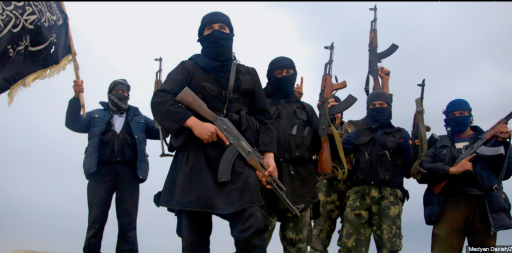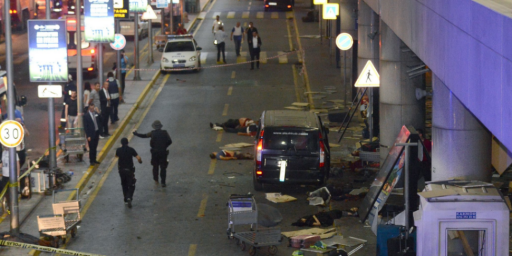Restoring the Caliphate
WaPo foreign corresponent Karl Vick argues that a reunified Islam is unlikely but not entirely radical.
The goal of reuniting Muslims under a single flag stands at the heart of the radical Islamic ideology Bush has warned of repeatedly in recent major speeches on terrorism. In language evoking the Cold War, Bush has cast the conflict in Iraq as the pivotal battleground in a larger contest between advocates of freedom and those who seek to establish “a totalitarian Islamic empire reaching from Spain to Indonesia.”
The enthusiasm of the extremists for that vision is not disputed. However unlikely its realization, the ambition may help explain terrorist acts that often appear beyond understanding. When Osama bin Laden called the Sept. 11 attacks on the World Trade Center and the Pentagon “a very small thing compared to this humiliation and contempt for more than 80 years,” the reference was to the aftermath of World War I, when the last caliphate was suspended as European powers divided up the Middle East. Al Qaeda named its Internet newscast, which debuted in September, “The Voice of the Caliphate.”
Yet the caliphate is also esteemed by many ordinary Muslims. For most, its revival is not an urgent concern. Public opinion polls show immediate issues such as the Israeli-Palestinian conflict and discrimination rank as more pressing. But Muslims regard themselves as members of the umma , or community of believers, that forms the heart of Islam. And as earthly head of that community, the caliph is cherished both as memory and ideal, interviews indicate.
[…]
The issue comes into sharp relief in Turkey, which is often held up as a democratic model for other Muslim nations but where empathy with fellow believers runs deep — as Karen Hughes, a presidential adviser and undersecretary of state, was reminded in September when angry complaints about civilian casualties in Iraq dominated a public appearance in Ankara, the capital. Here, the last caliph, an urbane scholar, Abdulmecid Efendi, was unseated in March 1924 by Mustafa Kemal Ataturk, the charismatic military officer who conceived modern Turkey as an exemplar of the system that places sovereignty in the nation-state rather than faith. Importing from France the notion that religion had no place in public life, Ataturk decreed that Islamic religious law was second to “the rule of law” by the state.
[…]
But while Turks won self-rule, most of the former caliphate was divided among European colonial powers. One Arab scholar called it “the division of Muslim lands into measly pieces which call themselves nations.” This is what inspired the group most directly focused on the push for a new caliphate, Hizb ut-Tahrir, or Party of Liberation. The group, which claims to be active in 40 countries, began in 1953 as an offshoot of the Muslim Brotherhood. But while the Brotherhood, which also favors a caliphate, embraced realpolitik, growing into a potent opposition force in Syria and Egypt, Hizb ut-Tahrir charted a more subversive path.
[…]
Some experts warn that such a reservoir of feeling illustrates the risk of framing the Iraq war as a contest of ideologies. “I think the smart thing to do if you’re the president of the United States is to sort of de-Islamicize the problem,” said Kirstine Sinclair, a University of Southern Denmark researcher who co-wrote a book on Hizb ut-Tahrir. “Talk about security risks instead. When you talk about expanding the war on terror to talk about states with an Islamist agenda or even the caliphate, you stir up emotions and you’re actually creating the clash of civilizations.”
Numerous polls show the U.S.-led wars in Afghanistan and Iraq have sharpened solidarity among Muslims and antipathy toward Americans. “To tell you the truth, I don’t see even see them as humans anymore. America is a pig,” said Orel, who is in his eighties. The trend appears greatest among the very people whom the radicals aim to mobilize. When young Muslims raised largely without religious instruction in European cities begin asking questions, radical groups stand ready with answers. Hizb ut-Tahrir, which promotes conspiracy theories and a potent anti-Semitism, is toward the moderate end of a spectrum of groups promoting unnuanced interpretations of Islam calling for confrontation.
“An ideology must perpetuate itself,” said Ahmet Arslankaya, an Hizb ut-Tahrir member in Turkey, where the organization faces harassment by security services. “Our final strategic aim will be to expand the Islamic thought to the world and carry the Islamic banner to the White House, of course.”
That, of course, works both ways. If our actions can add momentum to a movement with widespread sentimental backing, then it must also be true that the movement goes well beyond a few “radical” Muslims. While we’re short of a clash of civilizations, we should not pretend that most of the Islamic world shares our values.






The caliphate is intended to include any land the Muslims conquered including Spain.
Moslems are so lucky. They get to hate their hearts out and have the whole world bend over backwards to criticize the OBJECT of their hatred.
Must be nice.
They get to hate their hearts out…
Doesn’t sound like much in the way of fun to me.
Hating is hard work — trust me on this.